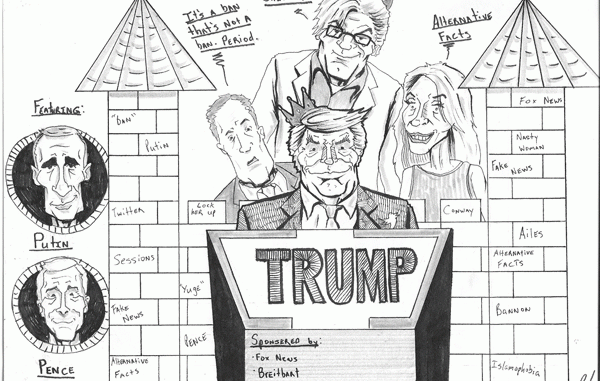
In early December of last year, a man armed with an AR-15 assault rifle went into Comet Ping Pong, a pizzeria in Washington, D.C., and fired off at least one shot, according to local police. The perpetrator, Edgar Madison Welch of Salisbury, North Carolina, claimed that he had entered the establishment to investigate claims that connected the Democratic Party and Hillary Clinton campaign manager John Podesta to a pedophilia ring housed in the restaurant.
Sites like InfoWars.com had previously alleged that, in emails recovered from former Congressman Anthony Weiner’s laptop, Podesta had been discussing a secret child sex-trafficking ring using coded language. Conservative Daily Post further added to the story with the headline “Breaking: FBI Confirms Evidence of Huge Underground Clinton Sex Network.”
The only problem: there was no underground sex network of trafficked children for the FBI to confirm. And yet, the pervasiveness of this false story put the lives of every customer and employee inside that pizzeria at risk. The story may have been fake, but its effect was very real.
We at The New Paltz Oracle condemn the crafting and dissemination of false news stories, and urge our readers to learn and understand the differences between legitimate journalism and fiction under the guise of journalism. We stand firmly against stories that lack a legitimate foundation, and do not condone journalism that publishes false ideas for the sake of sensationalism.
Since journalism is a competitive business, newspapers often face the pressure of being the first to cover a particular story. As a result, they may jump on certain stories that only have the possibility of being true. If a headline contains the word “might” or “may,” it is possible, if not probable, that the story is unconfirmed. That does not necessarily mean the story is false, but headlines like News One’s “Barack Obama May Receive $20 Million Advance from Memoir” rely on conjecture over evidence.
The financial aspect of journalism also can prevent certain conflicts that should always be noted. Al Jazeera, as well as its oft-shared online channel AJ+, is owned by Qatar’s ruling family. Russia Today, now known as simply RT, is funded by the Russian government. Breitbart, meanwhile, had Steve Bannon as its executive chair as recently as November. Bannon served as the chief executive officer for Donald Trump’s presidential campaign and now serves as the president’s chief strategist with a seat on the National Security Council.
As young journalists, we are proud that everything you’ve read so far in our paper has been real news but we remain disheartened by the very existence of fake news. We recognize the visceral threat that fake news plays in our already divisive world, acting as a subtle weapon with the ability to disrupt conventional societal consumption of legitimate reporting. Consuming news is not genetic, it is a learned skill. The ability to properly interpret news is one that must be consciously acquired through intelligent and mindful reading.
Understanding bias is the essence of responsible news consumption; most journalistic sources have some sort of political slant, but a reliable news organization should not allow that bias to affect the facts of the story. Readers should be open to scanning multiple news sources in order to discern the objective truths of the story. For every news article read in a liberal newspaper, one should also attempt to see how a conservative paper relays the same information.
While we do obviously recommend traditional mainstream sources like The New York Times, The Washington Post and the Associated Press, we also realize how Trump has managed to convince Americans to distrust reliable news sources in favor of heavily biased apologetics, like Breitbart. We want to encourage our readership, as well as news consumers in general, to check multiple sources for the same story. Just because it’s online doesn’t make it true and typically there are warning signs for fake news.
All evidence points to Russian interference in our election through a massive disinformation campaign, but blame is also due to the medium it is housed on. Facebook has said they are taking steps to address and eradicate fake news.
As young journalists, it has been extraordinary watching our field of study squarely at the center of a national controversy. With a president actively disputing facts, we recognize that fake news and alternative facts are not going away. They’ll be here for the 2018 midterms, the 2020 presidential election and all elections in between. President Trump scolded CNN’s Jim Acosta as fake news, while Bannon told The New York Times that the media should “keep its mouth shut.”
We are not fake news and we will not shut up. We will continue to report on current events as they unfold and question authority at every turn because that is the ultimate goal for a free press.
